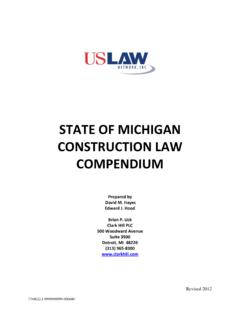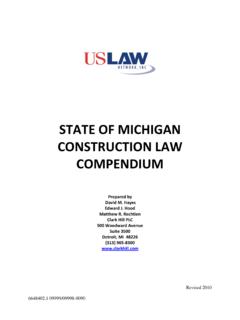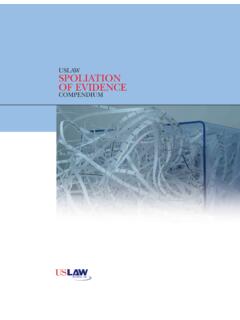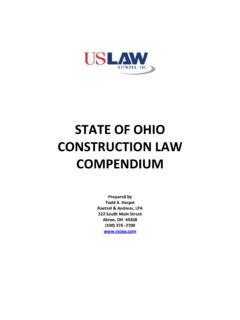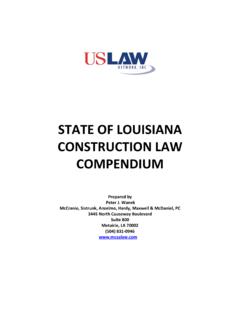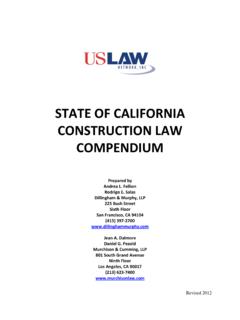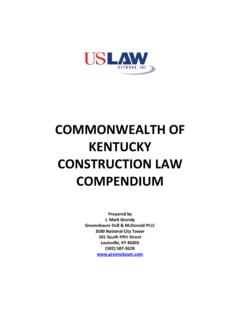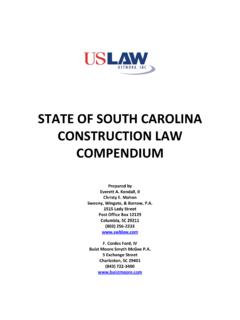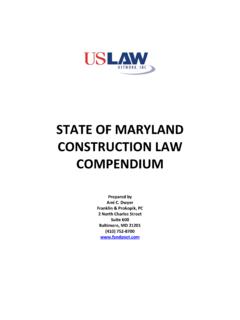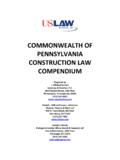Transcription of COMMONWEALTH OF VIRGINIA CONSTRUCTION LAW …
1 Revised 2010 COMMONWEALTH OF VIRGINIA CONSTRUCTION LAW COMPENDIUM Prepared by John H. Craddock, Jr. LeClairRyan Riverfront Plaza, East Tower 951 East Byrd Street, Eighth Floor Richmond, VA 23219 (804) 783-2003 2 Following is an overview of CONSTRUCTION law in VIRGINIA . VIRGINIA CONSTRUCTION law has much in common with other states , with some important distinctions. CONSTRUCTION cases in VIRGINIA generally sound in contract law, as economic damages cannot be recovered in tort.
2 VIRGINIA also disallows claims for strict liability, except with respect to abnormally dangerous activities or building materials provided by manufacturers and suppliers. I. Breach of Contract A. Possible Recovery Available to Plaintiffs In general, a homeowner must turn to contract law in order to recover damages for poor CONSTRUCTION , arguing that CONSTRUCTION defects represent a breach in the contract. In VIRGINIA , the statute of limitations for the breach of a written contract is five years, and for the breach of a non-written contract it is three years.
3 Va. Code Ann. B. Abandonment If a contractor fails to employ a sufficient quality and quantity of workmen, he may be deemed to have abandoned the CONSTRUCTION project. Bd. of Supervisors v. Ecology One, Inc. 219 Va. 29, 245 425 (1978). Under such a situation, the owner may proceed to complete the project and recover damages from the contractor. It is often unclear whether the contractor's performance, or lack of performance, constitutes abandonment. A contractor's mere failure to comply with a contract specification regarding materials to be used may not constitute abandonment.
4 However, to avoid the potential difficulty of determining whether a contractor's conduct constitutes abandonment, many CONSTRUCTION contracts expressly outline the circumstances under which an owner may declare a contractor to be in default and take over completion of the project. Further, under many contracts the architect is given the power to determine if abandonment has occurred. Notice to the contractor is usually required of the owner before he can terminate the contractor and commence completion of the project.
5 C. Plans and Specifications The united states Supreme Court s decision in united states v. Spearin, 248 132 (1918) has been cited with approval by the Supreme Court of VIRGINIA . See Southgate v. Sanford & Brooks Co., 147 Va. 554, 137 485 (1927). Thus, in VIRGINIA , the contractor is entitled to rely on the accuracy and adequacy of the contract documents upon which the bid is based. Worley Bros. Co. v. Marus Marble & Tile Co., 209 Va. 136, 161 796 (1968). Generally, an owner who furnishes a CONSTRUCTION contractor with plans and specifications furnished by the owner that prove ineffective or insufficient cannot recover from the contractor for loss or damage resulting 3 solely from the defective or insufficient plans and specifications, unless the contractor is negligent or has made an express guarantee or warranty that the plans or specifications are sufficient or free from defects.
6 See Richmond, Inc. v. Ewing s Sons, 200 Va. 593, 595, 106 595, 597 (1959). If there is a patent or obvious discrepancy, however, the contractor has a duty to bring it to the attention of the appropriate party for clarification. If the contractor fails to obtain such clarification, he may not be able to recover for the cost of extra work. Exculpatory contractual language whereby the owner seeks to transfer responsibility for detecting errors to the contractor may not be enforced depending on circumstances and the magnitude of the error.
7 II. Negligence In VIRGINIA CONSTRUCTION law, negligence is a cognizable theory for recovery in limited circumstances. VIRGINIA courts generally equate negligent performance of CONSTRUCTION with a breach of a CONSTRUCTION contract. VMI v. King, 217 Va. 751, 232 895 (1977). Nevertheless, an owner may successfully recover from a contractor on a negligence theory when the contractor causes damages that result from defects in plans of which he knew or should have known, but failed to warn the owner.
8 Id. Negligence claims allow recovery only for personal injury or for property damage, not for purely economic damages. Blake Constr. Co. v. Alley, 233 Va. 31, 353 724 (1987). On the other hand, plaintiffs often find that seeking damages for negligence has at least two advantages. First, plaintiffs in negligence actions are not restricted to mere consequential damages. Secondly, a lack of contractual privity does not bar recovery. This could be particularly helpful if the plaintiff seeks to bring an action against a third party for contribution.
9 The VIRGINIA Supreme court has repeatedly held that an action in tort cannot arise out of the negligent breach of a contractual duty. Dunn Constr. Co. v. Cloney, 278 Va. 260, 682 943 (2009); Augusta Mut. Ins. Co. v. Mason, 274 Va. 199, 645 290 (2007); Richmond Metro. Auth. v. McDevitt St. Bovis, 256 Va. 553 559, 507 344, 347 (1998); Spence v. Norfolk and Western Railroad Co., 92 Va. 102, 116, 22 815, 818 (1895). A recent Circuit Court case in line with these decisions held that when a plaintiff alleges that the defendant failed to construct their home in accordance within generally accepted industry standards and in a structurally sound manner and the only damages are economic losses an action for negligence cannot be maintained.
10 Weiss v. Cassidy Dev. Corp, 61 Va. Cir. 237 (Fairfax Co. Cir. Ct. 2003). Weiss also notes that code violations may not be the basis of a negligence action when the only damages are economic losses. In VIRGINIA , the standard for professional negligence is the failure to exercise the standard of care of those ordinarily skilled in the industry in question. In preparing plans and drawings, architects owe owners a duty to exercise skill and ability, judgment and taste, reasonably and 4 without neglect.
